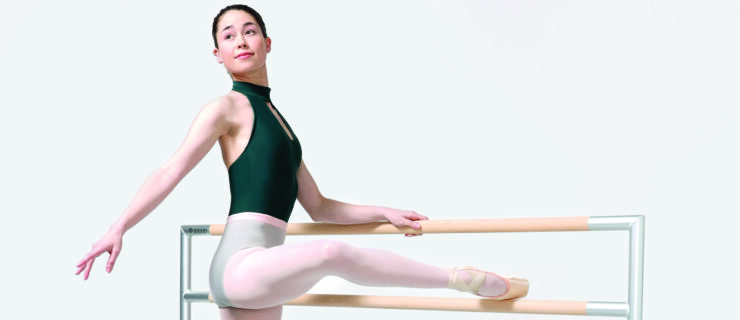Should You Be Taking Vitamins?
Dancers expect their bodies to give 100 percent, year-round—and with no time to feel tired, sick or sore, vitamins can seem like a magical way to prevent all ailments. When carefully incorporated into a healthy diet, vitamins can help boost your body’s health and performance. But blindly consuming an alphabet soup of daily supplements can do more harm than good. The key is to be thoughtful about which vitamins you choose, how much you take and when you take them. Don’t know where to start? Get the scoop on smart supplementing from our four specialists.
The Experts
Roberta Anding, director of sports nutrition at Texas Children’s Hospital and former registered dietitian for Houston Ballet
Dr. Andrea Stracciolini, director of dance medicine at Boston Children’s Hospital
Laura Moretti, registered dietitian of sports medicine at Boston Children’s Hospital and for Boston Ballet
Dr. Joey Fernandez, dance medicine physician with Harkness Center for Dance Injuries at NYU Langone Medical Center
Should I Be Taking Vitamins?
Roberta Anding recommends dancers begin with the question “Do I restrict any major food groups?” If the answer is yes, then you probably need to supplement your diet with vitamins. “Maybe you’re a vegetarian, or you avoid dairy,” she says, which can lead to deficiencies in calcium and vitamin D. “Whether by choice or by medical necessity, dietary restrictions lead to deficiencies.”
Have you suffered a recent injury? This can also be an indication of vitamin deficiency. “We often discover that dancers with muscular or skeletal injuries have low levels of calcium and vitamin D,” Andrea Stracciolini says.
When in doubt, a blood test can confirm deficiencies in several key vitamins. “I always encourage dancers to get tested because deficiencies can be hard to detect from the surface,” Anding says.
Which Vitamins (and Minerals) Are Most Important for My Dancer Body?
Iron
Key for: getting oxygen to your muscle tissues. “If you’re anemic (iron deficient), you may experience fatigue, shortness of breath or trouble staying focused and alert in class,” Anding says.
Dancers who should be especially conscious of iron intake? Female adolescents, because levels tend to dip with menstruation. Vegetarians, vegans and those who avoid red meat can also be at risk.
Calcium
Key for: skeletal health. “You only get one chance to build a skeleton, and that happens between the ages of 11 and 25,” Anding says. While calcium deficiency probably won’t show any negative signs right now, it takes a toll on your bones over time.
Calcium-fortified foods, like soy milk and orange juice, are a great way to boost calcium intake for lactose-intolerant (or dairy-free) dancers. “Calcium is a heavy mineral, so it tends to settle at the bottom of the carton in fortified beverages,” Anding says, “so make sure you shake them.”
Vitamin D
Key for: skeletal health. “Vitamin D plus calcium is the gold standard for a dancer’s skeletal health,” say Laura Moretti. Without vitamin D, your body can’t absorb the calcium it needs.
It’s common for calcium-fortified foods to contain vitamin D, as well, but Stracciolini finds that many dancers still have trouble getting enough from their daily diets. “Sunshine is the main source of vitamin D,” she says. “Dancers are indoor athletes, so they really don’t benefit from that natural source.”
Vitamin B-12
Key for: neurological health and energy. “Dancers who are low in B-12 may suffer from nerve problems or fatigue,” Joey Fernandez says. Because B-12 is primarily found in animal products, vegans tend to be at risk of deficiency.
When Should I Take Them?
“Dancers’ schedules can be so hectic and inconsistent,” Anding says. She suggests choosing a time of day when you tend to be home, since you’ll be more likely to remember.
Moretti recommends taking vitamins with a meal. “Fat-soluble vitamins—A, D, E and K—are stored via dietary fat,” she says, which is the fat you eat. “And iron can be tough on an empty stomach.”
All the specialists agree that if you’re taking both iron and calcium supplements, you’ll need to take them separately, because they compete with each other to be absorbed into your body.
Can Vitamins Harm My Body?
“Too much of a good thing is a bad thing,” Anding says. For example, when vitamin C is taken in excess (over 2,000 milligrams) chronically, it can cause kidney stones or gastrointestinal distress.
Fernandez adds that overdoing it on any vitamin can cause organ damage, and that fat-soluble vitamins can be especially dangerous because they’re stored in your tissues and can accumulate. “Plus, we can never truly know about the purity of products because the vitamin market is loosely regulated,” he says. Fernandez recommends looking for brands that are USP (U.S. Pharmacopeial Convention) verified, such as Kirkland Signature and Nature Made.
Can Vitamins
Replace Foods?
In a word: No! “Vitamins don’t give you any of the fiber, protein, carbs and fat your body needs,” Moretti says.
Fernandez adds, “Dancers get their best performance results when they rely on whole foods and good nutrition.”
Salad tip:
Skipping out on salad dressing? You may want to reconsider. Moretti recommends adding a touch of olive oil to help you absorb the fat-soluble vitamins in your nutrient-rich greens.
Vitamin or Mineral?
Why do we often lump vitamins and minerals together? Because there’s not much difference between them. In fact, most multivitamins actually contain a combination of vitamins and minerals.
“Vitamins are organic compounds, while minerals, like calcium and iron, are inorganic,” says Roberta Anding, director of sports nutrition at Texas Children’s Hospital. In this case, “organic” doesn’t mean “pesticide-free” as it does with foods. It simply means that vitamins contain the element carbon, whereas minerals don’t. “Both are equally essential for making sure your metabolic machinery [the parts that turn your food into fuel] is working effectively.”
Don’t Just Google It
If you’re curious about vitamins, seek out a qualified sports dietitian. “You’re an athlete, and you need someone who’s going to look at your intake from an athletic perspective,” Anding says. “You aren’t a mere mortal!”



